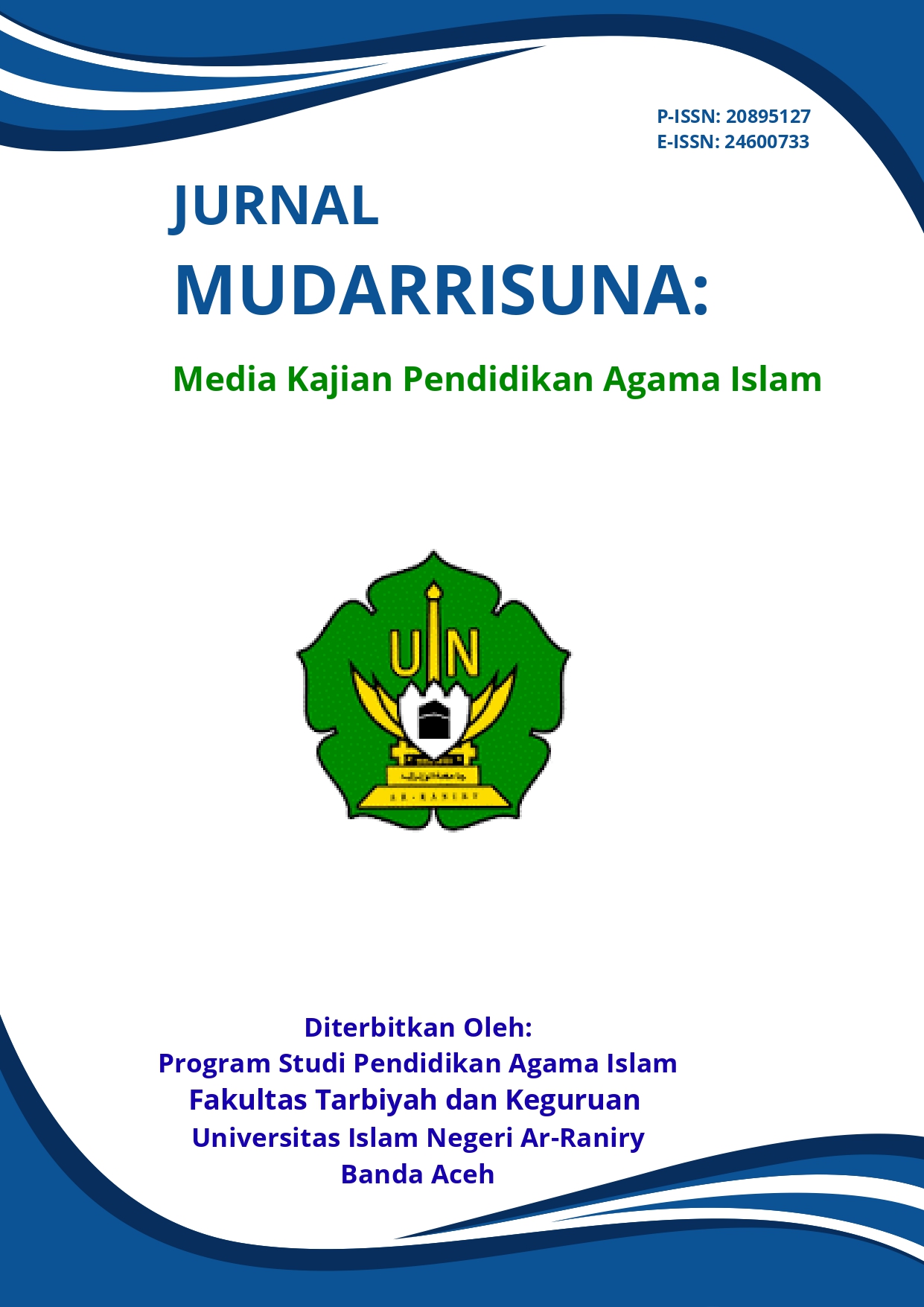Pendidikan Karakter Dalam Al-Qur’an Surat Lukman Ayat 12-19
DOI:
https://doi.org/10.22373/jm.v14i4.26875Keywords:
Character Education, Al Qur'an and Surah LukmanAbstract
Character education in the Qur'an is an important aspect that emphasizes the development of spiritual, moral and ethical values in social life. The Qur'an contains teachings that aim to form pious, intelligent, moral, noble, responsible and high-quality individuals. Character education in Surah Lukman verses 12 to 19 relates to the importance of teaching spiritual values, noble morals and responsibility to children from an early age. This surah contains Lukman's advice to his children regarding the oneness of Allah SWT, the obligation to do good, be filial to both parents, by prioritizing values such as gratitude, wisdom, respect, piety, honesty, trust, compassion, gentleness, love, responsibility. responsible, good character, good manners, humility, patience, and simplicity. These values are the basis for forming good character for children and are expected to help children grow and develop into individuals who are pious, intelligent, have noble character, are of good quality and are able to face life's challenges in the future
References
Abd Haris, (2007) Pengantar Etika Islam (Sidoarjo : Al Afkar,).
Achmad Mubarok, Psikologi Qur’ani, (2001). (Jakarta:Pustaka Firdaus)
Akhmad Muhaimin Azzel, Urgensi Pendidikan Karakter di Indonesia (Revitalisasi
pendidikan karakter terhadap keberhasilan belajar dan kemajuan bangsa), (Yogyakarta: Ar-Ruzz Media, 2011)
Agus Zaenal Fitri, Pendidikan Karakter Berbasis Nilai dan Etikan di Sekolah, (Jogjakarta: Ar-Ruzz Media, 2012)
Danim, S. (2011). Pengantar Pendidikan. Bandung : ALFABETA
Gunawan Heri, Pendidikan Karakter Komsep dan Imlementasi, Bandung Alfabeta 2003
Kementerian Pendidikan Nasional, Badan Penelitian dan Pengembangan, Pusat Kurikulum dan Perbukuan, Panduan Pelaksanaan Pendidikan Karakter (TK, TP: 2011).
Juriah dkk. Pendidikan Karakter di Sekolah Dasar. LP2 IAIN Curup. 2020.
M Qurisy Shihab, Tafsir al-Misbah “Pesan, Kesan dan Keseharian Al-Qur’an, (Bandung: PT Mizan Pustaka, 2012), 310.
Pupuh Fathurrohman, dkk., PengembanganPendidikan Karakter, Bandung: Refika Aditama. 2013
Ratna Megawangi, Character Parenting Space (Bandung: Mizan Publishing House, 2007)
Referensi : https://tafsirweb.com/7497-surat-luqman-ayat-13.html
Referensi : https://tafsirweb.com/7498-surat-luqman-ayat-14.html
Referensi : https://tafsirweb.com/7499-surat-luqman-ayat-15.html
Referensi : https://tafsirweb.com/7500-surat-luqman-ayat-16.html
Retno Listyarti, Pendidikan Karakter dalam Metode Aktif Inovatif dan Kreatif, (Jakarta: Erlangga, 2012)
Salim dan Bareisy Said, Terjemah Singkat Tafsir Ibnu Katsir Singkat, (Surabaya: PT Bina Ilmu, 2006)
Sofyan Mustoip, dkk., Implementasi Pendidikan Karakter, (Surabaya: CV Jakad, 2018)
Sudaryanti, “Pentingnya Pendidikan Karakter Bagi Anak Usia Dini,” Jurnal Pendidikan Anak 1, no. 1 (2015)
Syaiful Bahri Djamarah, Pola Asuh Orang Tua dan Komunikasi dalam Keluarga, Jakarta: PT. Rineka Cipta, 2014
UU RI Tahun 2005 tentang Guru dan Dosen serta UU RI No. 20 Tahun 2003 tentang Sisdiknas (Bandung: Citra Umbara, 2006)
Downloads
Published
Issue
Section
License
Copyright (c) 2025 hazrullah hazrullah

This work is licensed under a Creative Commons Attribution-ShareAlike 4.0 International License.
Jurnal MUDARRISUNA: Media Kajian Pendidikan Agama Islam allows the author(s) to hold the copyright and to retain the publishing rights without restrictions. Authors who publish in this journal agree to the following terms:
- Authors retain copyright and grant the journal right of first publication with the work simultaneously licensed under a Creative Commons Attribution-ShareAlike 4.0 International License that allows others to share the work with an acknowledgment of the work's authorship and initial publication in this journal.
- Authors are able to enter into separate, additional contractual arrangements for the non-exclusive distribution of the journal's published version of the work (e.g., post it to an institutional repository or publish it in a book), with an acknowledgment of its initial publication in this journal.
- Authors are permitted and encouraged to post their work online (e.g., in institutional repositories or on their website) prior to and during the submission process, as it can lead to productive exchanges, as well as earlier and greater citation of published work.




